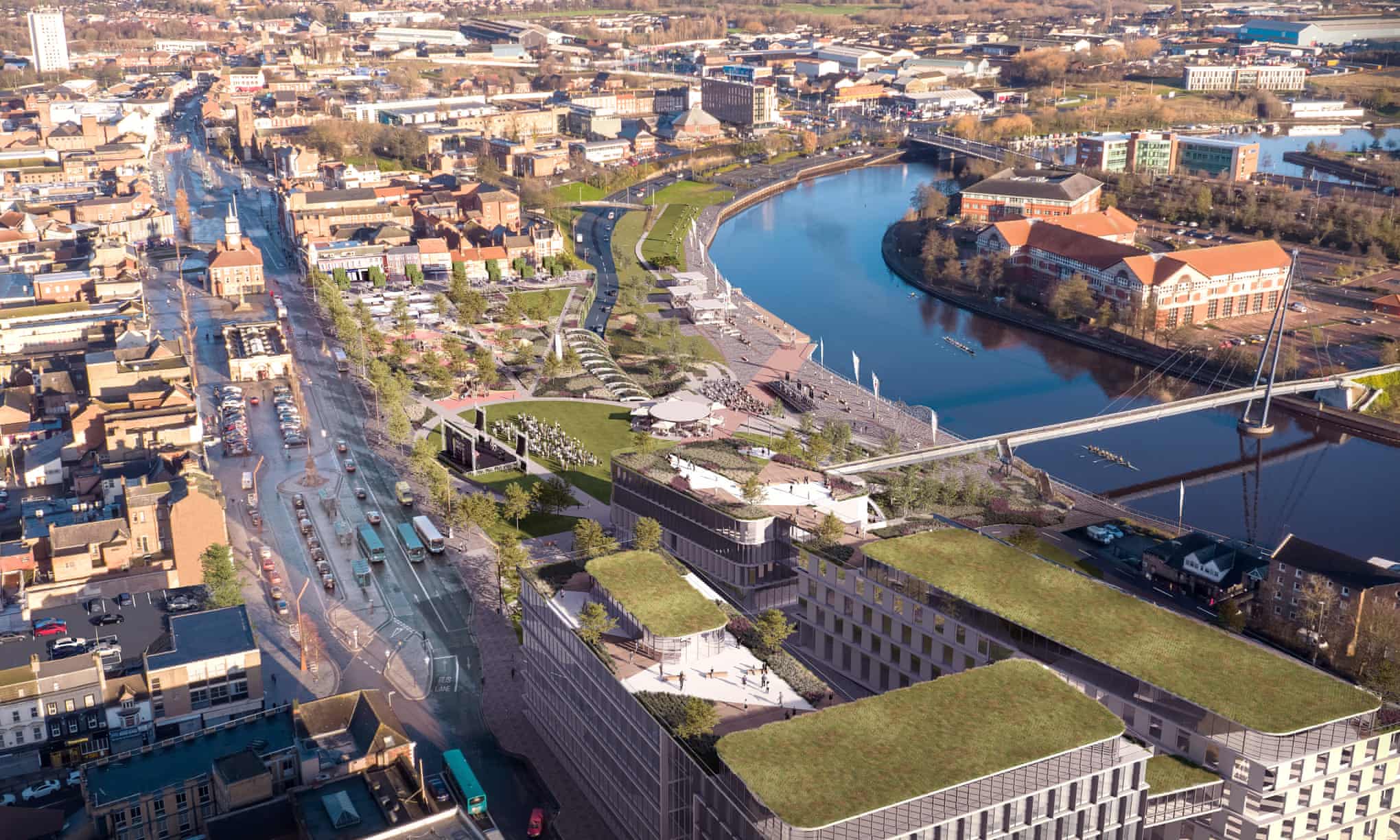Talking Points: February 2021
Posted on 04 Mar 2021 Categories: Blog, Climate crisis, Inequality, Local initiatives, Talking Points
by Rethinking Poverty
February’s Talking Points is inevitably focused on the climate crisis and the crisis of poverty and equality. Following the Chancellor’s budget announcement, what can we hope for? In both cases, not a lot. On climate, we see promising initiatives at city level, scepticism-arousing words at corporate level, and little action at government level. On poverty, we see a six-month extension of the universal credit uplift but little else. Survey findings that almost half the country believe that those who lost their jobs during the pandemic were underperforming are deeply disappointing.
What hope for the climate?
 February began with a slew of dire warnings – first from Mark Carney, former central banker, now the UN envoy for climate action and finance, who says the world is heading for mortality rates equivalent to the Covid crisis every year by mid-century unless action is taken. The investment needed to avert millions of deaths is double current rates, he says, lamenting that so little of the trillions of dollars governments are pouring into stimulus plans is going towards reducing carbon emissions.
February began with a slew of dire warnings – first from Mark Carney, former central banker, now the UN envoy for climate action and finance, who says the world is heading for mortality rates equivalent to the Covid crisis every year by mid-century unless action is taken. The investment needed to avert millions of deaths is double current rates, he says, lamenting that so little of the trillions of dollars governments are pouring into stimulus plans is going towards reducing carbon emissions.
‘We’re on a collision course with the planet,’ says Sir Partha Dasgupta in The Economics of Biodiversity: The Dasgupta Review. Between 1992 and 2014, there was a 40 per cent fall in the stock of natural capital per person. ‘That is the water we drink, the air we breathe, the soil we grow food in, and all living things shared among the global population. This really is capitalism for dummies,’ comments Larry Elliott, ‘because any company that was as cavalier about its inventories of all other forms of capital … would soon go out of business.’
What can we do?
First, the pull-out-all-the stops approach, advocated by economist Mariana Mazzucato in her new book Mission Economy. Yes, she admits, the Apollo programme was a doddle compared with today’s challenges. To tackle the climate crisis, we will need a vision or ‘mission’ and a stronger, more confident, entrepreneurial state; we will need to foster innovation and engage with voters. Owing to the pandemic, ‘the notion that there is no alternative to the status quo has, finally, been exploded,’ comments Larry Elliott. Sadly, Rishi Sunak’s budget speech showed little sign of vision or mission. ‘The chancellor has dropped the green recovery ball before the try line,’ comments Nick Mabey of environmental thinktank E3G.
What about the corporate world? All companies BlackRock invests in will be expected to disclose their carbon emissions and set targets to cut them, says the world’s biggest investor. Blackrock says it will eventually consider divestment from polluters who do not take action. Meanwhile Aviva has become the first leading insurer worldwide to set a target for a net zero carbon footprint by 2040. It says it has written to the 30 biggest CO2 emitters in its portfolio asking them to set net zero emission goals with fixed deadlines of 12 to 36 months. If they do not take action, Aviva says it will sell its shareholdings in those companies.
Action at city level
Anyone might be forgiven for a soupçon of scepticism about oil companies achieving net zero emissions, but efforts by cities, though on a smaller scale, inspire more confidence. The London Borough of Merton is adjusting parking permit charges to reflect emissions, with charges ranging from £170 a year for a 2016 Ford Focus to £650 for a 1999 Mercedes Benz E-class diesel – levels that the council believes ‘will disincentivise car ownership and use and encourage consideration of lower emission vehicles’.
In Stockton-on-Tees, the council plans to demolish half the high street and replace it with a park. If the plans go ahead, says councillor Nigel Cooke, ‘the project will see an ailing shopping arcade ripped up and replaced with a riverside park three times the size of Trafalgar Square … As retail continues to retreat, might our future high streets embrace the great outdoors?’ Now that is transformational!

In Gothenburg, a bench, a picnic table and racks for cycles and e-scooters have replaced a couple of parking spaces – and there are now ‘people talking, eating and enjoying themselves, despite subzero temperatures’. This pop-up public space is part of a Swedish urban experiment known as the ‘one-minute city’, which is in turn part of a government project called Street Moves which aims to investigate what happens when cars are displaced.
In Heidelberg, mayor Eckart Würzner is on a mission to make his city emission free. Part of this is reducing dependence on cars. Heidelberg is buying a fleet of hydrogen-powered buses, building a network of bicycle ‘superhighways’ to the suburbs and designing neighbourhoods to discourage all vehicles and encourage walking. Residents who give up their cars get to travel on public transport free for a year.
What can we do about deepening poverty?
Benefit claimants face large falls in income and a mounting debt burden, says the Resolution Foundation, which also reports that the latest Covid lockdown has ended work for 700,000 UK freelancers. A ‘shocking photo of 200 queuing for a soup kitchen in snow lays bare the problem of homelessness’, reports the Mirror.
The first thing is to maintain the £20 a week Covid top-up payment for universal credit. Cutting it would put more than 700,000 people into poverty, according to a Fabian Society study. The Chancellor has just announced that the top-up will be retained, but only for six months. ‘There were little more than crumbs for families on the breadline,’ comments NEF’s Miatta Fahnbulleh.
Improving jobs would be another great step. On 19 February, the UK supreme court dismissed Uber’s appeal against a landmark employment tribunal ruling that its drivers should be classed as workers with access to the minimum wage and paid holidays. But if Uber’s reaction is anything to go by, comments the Guardian, an employment bill is urgently needed. Uber denies that a principle has been set, believing the ruling only applies to a small group of workers from a period when a particular contract was in operation. The government has been accused of dragging its heels on promised reforms to zero-hours contracts and the gig economy as legislation has been delayed until the end of the year at the earliest.

A new Beveridge report?
Amid growing concerns over the unequal impact the crisis has had on the poor and low-paid, with an increase in destitution from 197,400 to 421,500 households last year, there have been calls for Boris Johnson to use the fallout from the pandemic as a moment to order a review of support for the poor on the scale of the 1942 Beveridge report. ‘We need to move into Royal Commission territory,’ says Louise Casey, Johnson’s former adviser on homelessness.
The RSA’s Economic Security Observatory argues for a focus on economic insecurity, which it says is creating ‘a politics of despondency and a politics of rejection’. ‘More policy, innovation and social change focus should be devoted to economic security as a mega-challenge.’ It cites Joe Biden’s proposed ‘enormous $2 trillion economic stimulus’, including $1,400 grants for low-earning Americans and a new child allowance for every child of up to $3,600 per year – a ‘heavily progressive, anti-poverty move’. Following on from this, the suggestion that ‘the very least that the UK should see is the Government making the £20 per week uplift in Universal Credit permanent’ seems a bit lame.
What is to blame?
Disappointingly, in view of an apparent softening of attitudes towards poverty reported in October’s Talking Points, a study by Kings College London called Unequal Britain found that nearly half of people believe those who lost their job during the pandemic were likely to have been underperforming. Just 31 per cent attribute it to bad luck. ‘There is no widespread appetite for change,’ concludes the final section of what Polly Toynbee calls ‘this devastating report’. ‘Most depressing is how many people attribute success and failure only to hard work and ambition: people believe this is a meritocracy, not a system governed by birth and luck.’ Since the 1970s, says lead author Professor Bobby Duffy, ‘individual blame has replaced systemic injustice as people’s explanation for inequality’. What the research does suggest is that ‘the best way to engage voters with inequality is through locality and place. But whisper the word,’ says Toynbee.
This conclusion is borne out by further findings of the Kings College study that a significant minority don’t think a widening post-Covid income gap between white people and BAME groups would be a problem. People care more about differences between geographical areas than races, genders and generations.
Yet a just-published report by charity Hope Not Hate finds that BAME communities have taken the hardest economic hit during the pandemic – reflecting the structural racism of the UK labour market. A poll found that one in five BAME people had lost their job, compared with 13 per cent of white respondents to an earlier poll.

Tax abuse and money laundering to blame?
Billions of people around the world are being trapped in poverty by systemic tax abuses, corruption and money laundering, according to a report by the UN high-level panel on international financial accountability, transparency and integrity (Facti), which says up to 10 per cent of the world’s wealth could be hidden offshore, and calls for a global crackdown. ‘Our report rests on two simple ideas,’ says Facti co-chair Dalia Grybauskaitė, ‘restore public finance by fixing a broken system and use the trillions of dollars released to eradicate poverty, recover from Covid and tackle the climate crisis.’
It seems that attitudes to tax may be changing, with tax rises no longer taboo in the UK, according to James Johnson. Though the public remain ‘hugely supportive’ of Rishi Sunak’s furlough scheme, Johnson reports ‘a ripple of concern’ detectable in focus groups about the eventual need to ‘pay it back’. But political parties should not assume this shift in the public mood is a wholesale return to the early 2010s. In December 2009, a YouGov poll showed that 52 per cent of people preferred spending cuts to tackle the deficit over tax rises, with the latter being the choice of 30 per cent. In 2020, the picture has reversed, with 27 per cent opting for spending cuts and 47 per cent for tax rises. Polling now shows support for changes to capital gains tax and an increase in corporation tax. As many as 56 per cent want to see taxes increase on online retailers. ‘And, increasingly, people are open to paying more tax themselves.’
Wellbeing not growth
In December, the Carnegie UK Trust published Gross Domestic Wellbeing (GDWe), which offers a holistic alternative to GDP as a measure of social progress. Using the framework and data in the Office for National Statistics Measures of National Wellbeing Dashboard, say the Trust, ‘we have developed – for the first time – a tool that provides a single figure for GDWe in England’.
One approach that prioritises wellbeing over economic growth is degrowth. As policymakers prioritise an economic rebound, scholars are showing an increasing interest in the idea. Degrowth would require societies to abandon the idea that GDP is an accurate indicator of progress, and instead learn to live better while producing less. It would reframe humanity’s goals to address the climate emergency by dramatically scaling down aggregate energy and resource use back into balance with the living world. At the same time, it seeks to reduce inequality and improve wellbeing through measures such as job guarantees, a shorter working week and potentially a universal basic income. What’s not to like?
Want to keep up-to-date with more articles like this? Sign up to our newsletter.
Posted on 04 Mar 2021 Categories: Blog, Climate crisis, Inequality, Local initiatives, Talking Points
